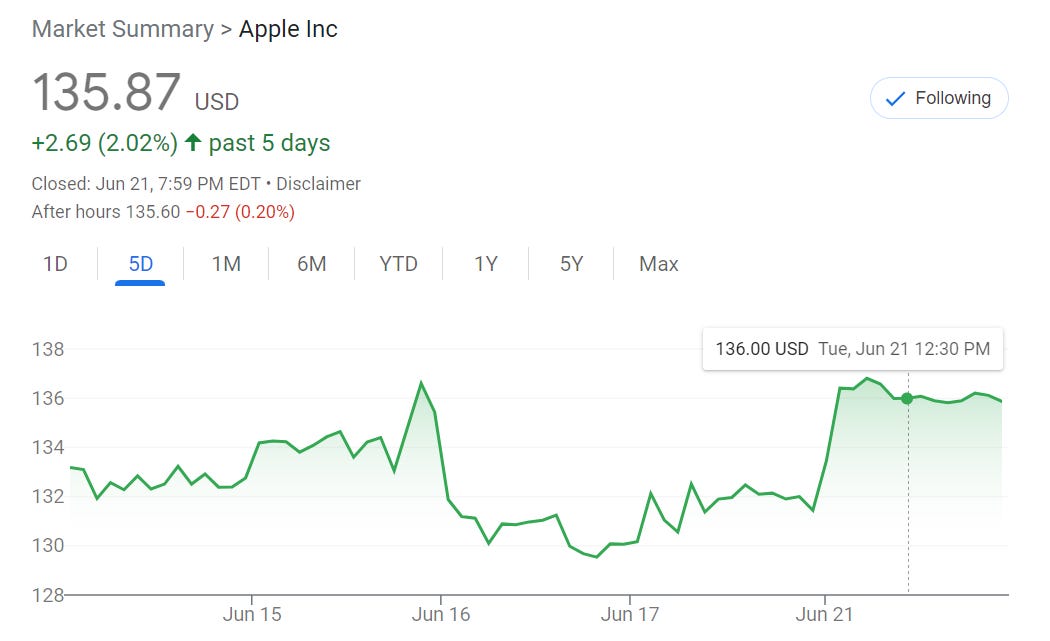As I alluded to a couple of weeks ago I work on an options trading floor. My most commonly asked follow-up question after telling new people this is “You got any stock tips?”
Now, my usual follow-up is, “No, I’m sorry. I trade interest rate options.”
After some more explaining, the conversation usually ends with, “So what are rates going to do to my stocks?”
To which I give the Weekly Upside company line and say, “just keep investing as much as you can afford in index funds via ETFs in the most tax-efficient way possible.” Boring right? Well, that’s what all the Gifs are for.
I can’t help you with your stock picks because it’s a waste of time, mostly. But also because it is not my specialty and I am nothing if not aware of my limitations.
I do however know a lot about options so let's talk about what they are.
Since we have demonstrated that none of you care about what I trade and only about stocks we will use stocks in this exercise (that’s an options term, there are levels to this game). We will also focus on buying options since you need a crazy amount of experience and capital to be an options seller.
When you buy an option, you are acquiring THE OPTION to buy or sell the stock that it is tracking. Essentially this allows you to bet on whether a specific stock will go up or down. We’ll use the world's largest stock Apple for this example (Ticker: AAPL).
Apple has been chopping around for the last week, but let’s say we think it's going to make a move one way or another soon. If we think it's going…
UP -> Buy a CALL option
DOWN -> Buy a PUT option
If you buy that option and it goes in the direction you think, you will most likely make money. The key phrase is most likely. Because if you want to bet on Apple going up and buy a CALL you first need to choose an expiry.
And you have almost unlimited options that extend over a year out (this isn’t even all the available expiries). But let’s say you pick July 15th.
Again, lots of choices here. The number in the left column is called a strike price. If you buy a $150 strike price call for example you are betting that Apple will go above $150 by the expiry you picked June 17th.
Now if Apple finishes below $150 on June 17th, sorry my friend but you lost whatever you paid for the option. Which in this example would be the right column the “ask price” multiplied by how many options you want, multiplied by 100 (each option represents the right to buy 100 shares of a stock). So in this case scenario, you would have lost…
0.55 x 1 x 100 = $55
Fifty dollars, that's nothing right?
Well, that is the beauty of options, it is a cheap way to get exposure to stocks that you want. This is what we call leverage. And you are right and Apple finishes at lets say $155 on June 17th, you are a winner, my friend. Because you bought a CALL option you have the right to buy 100 shares of Apple for $150 even though its trading at $165!
That’s an immediate profit of $5 ($155-$150) which means after you take out what you paid ($0.55) you made $4.45 x 100 for a net profit of $445!
So this is the good part about options. Much like a scratch-off lotto ticket or a multi-leg parlay, these offer huge payouts for a small upfront cost. This is why people become enamored with them and r/wallstreetbets is full of examples of people using these to try to hit big winners.
The option we discussed above, for example, has roughly a 10% chance of being worth anything by the time it expires. Meaning if you do this every month you will likely lose 9/10 times!
What’s the Upside?
Options are a complex financial contract used essentially to bet on the stock market. So while it is fun to buy some lotto tickets or place some bets this is not a great strategy for building long-term wealth in the stock market. Don’t mistake luck with skill, especially with options.
This was just an intro to options, if you read this and still think they are for you stay tuned for an upcoming article on tales of options trades gone wrong.
For Your Weekend
Watch:
Alcatraz (Prime Video, others) Alcatraz benefits from a truly bonkers premise: a whole bunch of inmates and guards disappeared from Alcatraz in 1963 — and now they’re reappearing 50 years later and they have unresolved business. Sam Neill heads up a covert government agency that is tasked with keeping tabs on those returnees, and it is not an easy job. I don’t know — sometimes you need a break from modern day thinky TV. Try an episode! (Brett White - Decider)














